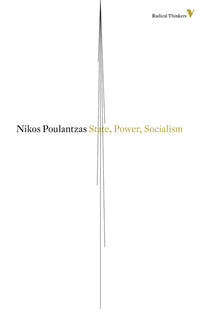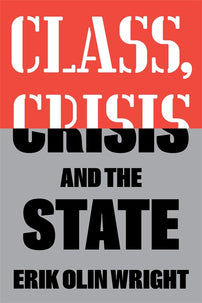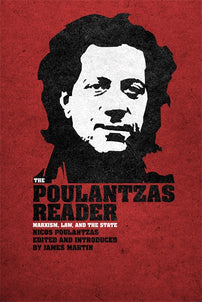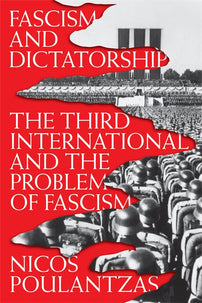Seven Theses on the Capitalist Democratic State
What is the capitalist democratic state and how should it be confronted? The left has typically seen the state either as an instrument of class rule that needs to be "smashed" or, as with social democracy, as a neutral medium which can be wielded by functionaries with the correct ideas. In this, a series of seven theses on the nature and function of the capitalist state, Michael A. McCarthy argues that both are wrong and that we need a reinvigoration of the late work of Nicos Poulantzas for a full, democratic understanding of the state.

What is the capitalist democratic state and how should it be confronted? This question has bedevilled the left for generations. On the one hand, a social democratic conception of the state as a neutral institution that needs to be occupied and captured by bureaucrats with the right ideas has lead to experiments in socialist governance that have failed to overcome the private power of capitalists and turned toward neoliberal reversals. On the other hand, a conception of the state as an instrument of class rule that must be “smashed” has failed to find support by the working classes in the advanced capitalist countries, and in the less developed countries where it has mobilized revolutionary struggle, top-down, authoritarian forms of political power have been the long-run result. Though exploratory, not comprehensive and in large part culled from the reflections of others, here I would like to offer seven theses toward developing a third approach to capitalist democracies, one commonly associated with the writings of Nicos Poulantzas, that breaks with both the social democratic and the revolutionary models on offer.
Thesis 1: The capitalist democratic state is not a neutral playing field or a unitary subject, instead it is a set of loosely interconnected institutions that are sites of struggle.
Against social democratic treatments of the state as merely a neutral institutional ensemble, and revolutionary treatments of the state as an instrument of capitalist class domination, the capitalist state is a contradictory social relation. The capitalist state is not a thing/instrument acting at the behest of the capitalist class, nor a unitary subject with its own predefined organizational and corporate interests. Neither is it an alienated socio-political form that is superimposed upon humanity’s democratic essence, to be smashed wholesale in some great final battle once working-class power has been sufficiently built up outside of it. Lastly, it is not a political form that can be thought of as derivative of the logic of capital itself.
The capitalist democratic state is a social relation in much the same sense that capital itself is a social relation. It is the political expression of active material forces whose power is in part both produced and reproduced through its institutions. This conception of the state in capitalist democracies, where the relations of class struggle are both constituted by the state and traverse its terrain to both produce and resolve internal contradictions, must be our starting point for clear thinking about it. State institutions in capitalist democracies contain the contradictions among and between social classes that persist in society. The upshot of this view is that while, as we will see below, there are deep biases in the institutions of the capitalist democratic state to govern in favor of the reproduction of capitalism, those biases coexist with opportunities for democratic forces to counter-organize on that same terrain.
[book-strip index="1" style="buy"]Thesis 2: The capitalist democratic state is relatively autonomous from any specific class or class fraction. Like Frankenstein’s monster, this creates the always present possibility that the hand of the state can turn on its master.
The capacities of states are conditioned by their deep embeddedness in capitalist social relations, but are not merely reducible to or epiphenomenal of them. The structure of the capitalist democratic state and its arms length governance over these relations establishes the political preconditions for the maintenance and reproduction of capitalism. This “relative autonomy” is usually explored in terms of the “functions” that it serves for the reproduction of capitalism more generally. But to explain relative autonomy with how it functions is magical thinking. The function of a thing is often quite distinct from why that thing came to function in that way in the first place or why that function itself is reproduced.
Instead, capitalist democracies are relatively autonomous for entirely historical and developmental reasons. Those capitalist states that were captured entirely by their insipient capitalist classes, acted at the behest of capitalists rather than on their behalf - and as a direct result governed in ways that ran counter to capitalist growth. That the most developed capitalist countries are also capitalist democracies must be reckoned with.
Without this distance from particular capitalists, the capitalist democratic state would not be able to govern as effectively for capitalist growth. A state simply captured by capitalists faces two basic constraints. First, capitalists are too short-sighted and concerned with profit making to engage in the kind of social investments that make capitalism thrive. If either capital or capitalists wielded the state like an instrument, capitalist democracies would be unlikely to engage in spending on infrastructure, research and development, and education that help commerce and increase profits. Second, capitalism itself is too self-destructive to thrive without active state intervention. Competition, falling profits, crises of demand, and social crises are all more effectively managed by a political authority that can act independently for the long-term interest of capitalism, even if at the cost of the immediate short-term interests of particular capitalist class fractions. In many cases democracy offers up the mechanism necessary for the generation of this governing distance. But as the herculean rise of China shows so well, relative autonomy can also be secured by other means than formal democracy.
This leads to a critical contradiction present in any capitalist democracy, a contradiction that might be termed “the Frankenstein problem.” That the capitalist democratic state has a certain autonomy which allows it to help capitalism means that it might also have the capacity to harm it. While the capitalist democratic state tends to govern for capital, like Frankenstein’s monster it can – and indeed has - become a force out of the capitalist’s control that can wield policy tools once used to reproduce capital against it.
Thesis 3: Though the capitalist democratic state on the whole tends toward relative autonomy, capitalists still use their resources to directly influence the policy making process.
Relative autonomy hardly means that political institutions and actors are shielded from outside cooptation and control. They are subject to possible capture and capitalists know this, so expend huge amounts of resources to achieve it. Capitalists have control of key resources in society, namely wealth. In capitalist societies, as Marx urged us to grasp with the general law of capitalist accumulation, this control concentrates. Rising levels of inequality in income and in particular wealth, unless mitigated by countervailing forces of war devastation or welfare state expansion, has borne out in capitalism’s historical record. Resource inequality gives capitalists greater capacity to influence the policymaking process. They are better able to use concentrated resources to both control and influence politics by hiring legal talent, contributing to campaigns, developing coordinated lobbying efforts, hiring technical consultants, enhancing social prestige and reshaping information available to the electorate.
These resources also afford the capitalist class a networked status that other classes simply don’t have. In most capitalist democracies they are a fixture of the policy-making process, using their involvement in think tanks and research institutes to help write policy papers for policymakers. They also share a similar cultural background with politicians. That their children go to the same elite schools and they have vacation homes in the same places affords them additional political capacities. This combination of material and social resources simply makes the capitalist democratic state more easily traversable for capitalists than ordinary workers.
[book-strip index="2" style="buy"]Thesis 4: Bureaucrats and elected officials in the capitalist democratic state are dependent on the reproduction of capitalism.
Even in the event that money and connections of this sort was eliminated from politics wholesale, politicians in capitalist democracies would still be dependent on the investment of capitalists into the economy. Though capitalist work is undemocratic, exploitative and a source of frustration for workers, in a capitalist society it is necessary for workers to survive. Recall that in capitalism workers “must be free in the double sense.” As the old adage goes, the only thing worse than working is not working. Without that freedom from subsistence workers could exit to work elsewhere, for themselves, or opt out of work entirely. Historically, capitalists have fought tooth and nail against this exit option, or anything that makes life easier without work. Without a viable exit option, the welfare of most workers then depends directly on the welfare of firms. Consider the firm that moves its factory because of new emission regulations resulting in the loss of the main source of income in a town. On a larger scale, if the business environment sours enough capitalists can withdraw their investment causing a recession. The result is that everyone suffers right alongside capital.
The ability to redirect investment is not just the chief way that business exercises its economic power; it is also the primary source of businesses’ political power as well. Politicians both anticipate and react to disinvestment and try to govern in ways that not only avoids it, but actively boosts the confidence of capitalists that theirs is a good place to invest and make profits. This is not because politicians are ideologically committed to capitalism, even though they often are. More fundamentally, it is because they know what will happen if they don’t and instead put forward policies that too deeply cut against the profit interests of firms. In such an event, businesses will disinvest, the state will lose tax revenue, people will lose their jobs, and come next election cycle those same politicians will likely be voted out of office, if their government doesn't collapse beforehand or get toppled by a coup.
This crucial aspect of the capitalist democratic state generates a built-in bias for capitalist profitability that can’t be avoided by simply replacing the personnel in the state with socialists. Capitalists have this investment power because of their structural prominence in the economy more generally. In having such an elevated position, when firms simply allocate investment in ways that follow market signals it is often enough to shape politics. They might do this intentionally, as in a coordinated investment strike, but even if it is unintentional the political consequence can be much the same.
Thesis 5: The capitalist democratic state faces a contradictory task of both fostering capitalist accumulation and reproduction, and of generating legitimacy.
Because of the dependence politicians have on capitalist investment and the pronounced role of corporate influence in politics, capitalist democratic states tend to help organize the political hegemony of the capitalist classes and to disrupt and disorganize that of the working classes. The capitalist democratic state, in normal times, becomes the arena in which capitalists fight over and policymakers lead on what path for capitalist accumulation the state will most encourage.
Though violence is a critical part of the state’s governance techniques over populations both domestic and foreign, capitalist democracies also rely on a social peace between the classes that only the consent or resignation of the exploited, expropriated and dispossessed can generate. We can consider this consent or resignation the main source of the state’s legitimacy and is primarily generated through public acquiescence and electoral stability. In other words, the population in any given capitalist democracy has one of two ways to de-legitimize the capitalist democracy: either through disruption (protests, marches, strikes, and riots) or elections (politicians can be voted out of office). The so-called free and fair election and the party system are key means for governments to claim mandates from “the people.”
Yet governing for accumulation sometimes comes into contradiction with the imperative to secure legitimacy, and often the latter is sacrificed for the former. A legitimacy crisis takes hold when the old hegemonic order breaks down and what was once common sense and taken for granted by politicians is viewed with public scorn. Historically this tends to go one of two ways. The legitimacy of the old order is restored, either by its bruised champions or boosters fresh on the historical scene or another set of ruling principles is foisted into its place. In the context of such a crisis, expectations are in flux and new spaces open for ideas and practices that were once at the margin, either left, right, or both. Advanced capitalist democracies today are now deeply embroiled in such a legitimacy crisis.
[book-strip index="3" style="buy"]Thesis 6: In the context of legitimacy crises, class struggle has resulted in new laws, rights, and programs that are a key sources of worker capacity, solidarity, and power.
While these general conditions tend to account for the state’s basic operations in normal times, the particular form capitalist democratic states takes varies. That form reflects the history of class struggle and political organization imprinted on its institutional terrain. Like the length of the working day, when workers achieve victories upon it they are able to change the conditions of their own survival. These gains have to be continually defended against encroachments by capital and the erosion of state enforcement, again much like the length of the working day or other benefits or gains won at the workplace. This points to yet another contradiction about the capitalist democratic state itself. It is simultaneously true that the capitalist democratic state confronts constraints in capitalism that can lead it to crush working class movements and that laws, policies, and rights organized through it can help enhance working-class power.
If the state only demobilized and weakened working class capacities, it would run counter to worker interests to aim for any kind of reforms upon its terrain. Such reforms, in this simplistic undialectical view of the state, would be coopted and twisted for the purposes of capital the moment they touched the formal political process. Yet this has not been the case, historically, across a wide range of gains. That some capitalist states have robust welfare provisioning and worker representation, albeit in limited and constrained ways, suggests that reform does not simply lead to reversal. Working-class struggles during the nineteenth and twentieth centuries played a significant role in the emergence of modern welfare states, as well as the bolstering of liberal rights and installation of democratic practices. Among these were universal suffrage, free speech and association, and, in the United States, abolition. That some of these gains have been durable underscores the point that the capitalist democratic state is not solely an object of repression. It is Janus-faced, with another side offering possibility for relative empowerment.
Thesis 7: The capitalist democratic state is made up of historically specific institutions. We can only understand the state tactically by analyzing it conjuncturally.
Quite simply, the degree of relative autonomy of the state is variable over time and between existing capitalist states. Ahistorical theoretical pronouncements about the nature of the capitalist state serve an important role in theory at a very high level of abstraction, but as something to inform political action is no substitute for understanding actually-existing capitalist democracies. Conjunctural analysis is therefore necessary to understand the scope of state capture by interest groups and the structural dependencies between the state and sectors of capital or particular capitalists. For socialists then, any tactical approach to politics should be directly informed by such a conjunctural analysis. Only meaningful conjunctural analysis can offer up insight on what is possible in any given historical moment.
Conjunctural analysis of the state, as is, should consider the structural prominence of capital in the economy relative to public employment, the structural prominence of particular sectors of capital, and the structural prominence of particular firms. Similarly, it should consider the degree to which particular positions and state agencies are representative of one class or another, how those agencies function, and what political interests occupy the positions that govern those political bodies and agencies. And finally, it should adequately gauge the state’s governing legitimacy and shifts in the popular mood.
What the capitalist democratic state actually does in any given conjuncture will be a matter of its structural dependency on capital and the balance of class forces both in society and condensed and in actual political institutions. That the capitalist democratic state tends to be structurally compelled to govern for capitalism and legitimacy will generate a menu of governance options reasonably suited to both tasks that policymakers come to identify through research, assessment and deliberation. Yet in any given conjuncture, there will be a range of competing policy paths to achieve similar ends. The particular path selected will likely be the result of the balance of class forces both inside and outside of state institutions.
The balance of class forces points to deep variability in both the direct power of capitalists and the structural prominence of capital in the economy on the one hand and the power of exploited, expropriated, and dispossessed people on the other. As the composition of the economy is shifted away from employment in capitalist firms toward public employment and workplace democracy, and the people are less dependent on international financial constraints and freed from imperialist modes of international relations, the structural power of capital in the capitalist democratic state will weaken relative to that of other classes. All this suggests that the state is hardly something simply neutral or a social force that should be smashed outright, but instead a deeply biased set of institutions that should be organized upon, challenged, and transformed both from inside and out.
Michael A. McCarthy is an assistant professor of sociology at Marquette University.
[book-strip index="4" style="display"]









